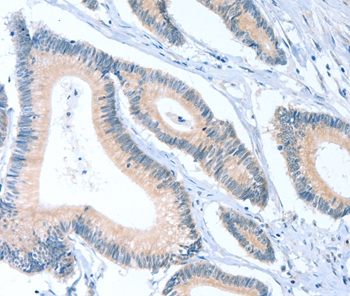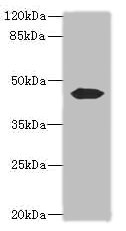
WB analysis of human testis lysate using GTX88858 ACTL7B antibody, Internal. Dilution : 0.03μg/ml Loading : 35μg protein in RIPA buffer
ACTL7B antibody, Internal
GTX88858
ApplicationsWestern Blot
Product group Antibodies
ReactivityHuman
TargetACTL7B
Overview
- SupplierGeneTex
- Product NameACTL7B antibody, Internal
- Delivery Days Customer7
- Application Supplier NoteWB: 0.03-0.1microg/ml. *Optimal dilutions/concentrations should be determined by the researcher.Not tested in other applications.
- ApplicationsWestern Blot
- CertificationResearch Use Only
- ClonalityPolyclonal
- Concentration0.50 mg/ml
- ConjugateUnconjugated
- Gene ID10880
- Target nameACTL7B
- Target descriptionactin like 7B
- Target synonymsTact1, actin-like protein 7B, actin-like 7-beta, testis tissue sperm-binding protein Li 43a
- HostGoat
- IsotypeIgG
- Protein IDQ9Y614
- Protein NameActin-like protein 7B
- Scientific DescriptionThe protein encoded by this gene is a member of a family of actin-related proteins (ARPs) which share significant amino acid sequence identity to conventional actins. Both actins and ARPs have an actin fold, which is an ATP-binding cleft, as a common feature. The ARPs are involved in diverse cellular processes, including vesicular transport, spindle orientation, nuclear migration and chromatin remodeling. This gene (ACTL7B), and related gene, ACTL7A, are intronless, and are located approximately 4 kb apart in a head-to-head orientation within the familial dysautonomia candidate region on 9q31. Based on mutational analysis of the ACTL7B gene in patients with this disorder, it was concluded that it is unlikely to be involved in the pathogenesis of dysautonomia. Unlike ACTL7A, the ACTL7B gene is expressed predominantly in the testis, however, its exact function is not known. [provided by RefSeq, Jul 2008]
- ReactivityHuman
- Storage Instruction-20°C or -80°C,2°C to 8°C
- UNSPSC41116161





